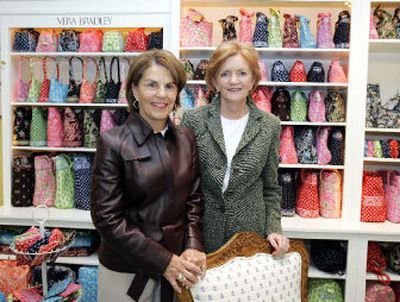A pattern for success

FORT WAYNE, Ind. – Inside a bustling warehouse, new hires at Vera Bradley Designs practice stitching paisley placemats and pink coin purses in patterns with names like Petal Pink and Chelsea Green. Nearby, others slice swatches of bold pink, blue and green quilted fabric destined to become handbags, purses and luggage.
With 200 employees and another 800 contract sewers churning out hundreds of thousands of items each year, Vera Bradley barely resembles its beginnings in 1982, when founders Patricia Miller and Barbara Bradley Baekgaard sold their first quilted cotton purses out of their homes.
Annual sales surpass $100 million. More than 3,500 U.S. retailers and several international shops carry the handbags, which are so popular that an estimated 40,000 people descend on the company’s annual outlet sale, scheduled for May 4-6 this year. Devotees also flock to Web sites, swapping advice on colors and delivering commentary on what style is best for toting gym clothes, laptops and diapers.
Now, the design house plans to introduce eyewear, pet gear and home decor, hoping to convince even more people that quilted is cool.
“Vera Bradley is becoming more of a lifestyle,” said Baekgaard, whose mother, Vera, was the inspiration for the company’s name. “I think it is the sorority element. When you see someone with the Vera Bradley bag, there is a sisterhood there.”
That sisterhood has fueled a 30 percent growth in sales each of the past five years, company officials say. Officials at the privately held business declined to provide specifics, but a 2004 zoning application showed the company had more than $93 million in sales.
Many of the buyers are teenagers and college students introduced to the line by their mothers, whom the company targets with limited-edition products such as silk scarves, belts and umbrellas. The company changes its look twice a year, retiring four fabrics and replacing the line, or “bouquet,” with new colors and prints. About 14 prints are in rotation at one time.
“If a high school girl is carrying something, she doesn’t want to carry something her mother is carrying or, God knows, what her grandmother is carrying,” Baekgaard said. “(Teenagers) say it with pride. ‘This is my pattern. This is the pattern my mother is carrying.’ There are stages in their lives where they don’t want to carry what you’re carrying. This is the exception.”
Vera Bradley’s popularity has been a boon for retailers as well.
Woodstock, Conn.-based Crabtree & Evelyn, Vera Bradley’s largest retail customer, says the company’s products have helped boost growth of its accessory division by 20 percent since 2001. Vera Bradley products are among the company’s top 10 sellers, said Scott Sincerbeaux, vice president of Crabtree & Evelyn’s North American retail division.
Every Crabtree & Evelyn store carries at least four Vera Bradley fabric patterns in 26 styles, he said.
Susie Perrin, a gift buyer at Watson’s Greenhouse and Nursery in Puyallup, Wash., said the company’s product line has wide appeal. “It’s just vibrant and it’s really classy looking,” she said.
Marshal Cohen, chief industry analyst with the Port Washington, N.Y.-based NPD Group, said affordability plays a big role in Vera Bradley’s success. Prices for the company’s bags and luggage lines range from $13 to $126 per item, compared with Coach purses that can retail for $800.
“Not everybody is going to get a Coach bag,” Cohen said. “Even if I want one, I’m not going to be in a financial position to afford it. There’s affordable luxury and then there’s true luxury. (Vera Bradley) fits into the affordable luxury category.”
But Vera Bradley isn’t resting on its paisleys.
In the past 18 months, the company has licensed its name to high-priced furniture, rugs, linens and stationery, and plans for pet carriers, dog collars, lunch bags, lamps and eyewear are in the works. The company also has begun making its handbags in microfiber, silk and linen, Baekgaard said.
As imitators try to capture a share of the market, the company is stepping up efforts to control its image. In January, it banned online retail sales by anyone but Vera Bradley so it could better control shipping and customer service.
It also requires retailers to stock all the available prints and install at least 12 feet of white, illuminated wooden shelving to display its products. Stores are encouraged to purchase other decor, such as a Vera Bradley-authorized chandelier, arm chair and blue and white rug.
Mona Kramer, owner of Little House in LaPorte, Ind., spent $10,000 last summer creating a 450-square-foot Vera Bradley room inside her gift store in the community about 25 miles west of South Bend. The room has helped her recover lost sales after Vera Bradley halted online sales by retailers.
“I wanted to build up on the store stuff,” Kramer said.
The Randolph-Macon College bookstore in Ashland, Va., began selling Vera Bradley products last summer. Now, the store sells more than a dozen of the designer bags each day to students, their parents and nearby residents.
Emilie Davis, a 21-year-old junior at Auburn University, has 15 Vera Bradley pieces in her collection – mostly monogrammed items from the company’s retired red bandanna print.
“It’s easy to pack, it’s lightweight, it’s not heavy,” she said. “And they’re cute bags.”